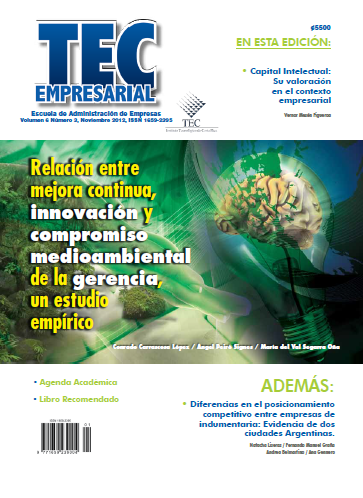Capital Intelectual: Su Valoración en el Contexto Empresarial (Intellectual capital assessment on the entrepreneurial context)
Main Article Content
Abstract
La evolución que la economía mundial ha experimentado durante las últimas décadas ha traído consigo, entre otros hechos importantes, un cambio en el concepto y, por consiguiente, en las metodologías que son utilizadas por los expertos para la determinación del valor de una empresa en marcha. Es así como, hoy en día, el valor de las empresas se fundamenta preponderantemente en la capacidad que sus activos intangibles (dentro de los cuales se destaca el capital intelectual) tienen de generar beneficios económicos futuros, esto en contraposición al anterior esquema de valoración de empresas, el cual únicamente tasaba el valor de éstas en función de la productividad de sus activos tangibles.
El presente artículo pretende reseñar las metodologías que actualmente son aceptadas y utilizadas para determinar el valor tanto financiero como contable del capital intelectual propiedad de una empresa, estableciendo a su vez, de forma clara, las diferencias importantes que existen entre ambos enfoques.
Finalmente, se hacen algunas reflexiones acerca de la importancia que los activos intangibles y, en particular, el capital intelectual tienen tanto en la gestión estratégica y funcional de las empresas como en los procesos de valoración de éstas. Asimismo, se hace énfasis en la necesidad de que los expertos en materia de valoración financiera y contable de las empresas continúen trabajando en la búsqueda de un consenso para estandarizar un criterio que permita reflejar, de forma apropiada, el valor financiero de una empresa a nivel de sus estados financieros de uso general.
ABSTRACT
The behavior of world economy on the last few decades has brought on, amongst other issues, a change in the concept and methodologies used by experts to value an ongoing business. Nowadays, a business is valued for the capacity of its intangible assets (specially its intellectual capital), to generate future benefits as opposed to the older view of business valuation that centered on the productivity value of its tangible assets. This article aims at summing up all the currently accepted and used methodologies to value both financially and accountably the intellectual capital owned by a business, clearly establishing the main differences found in either approach. Finally, some considerations are given about the importance that intangible assets (particularly intellectual capital), have in the strategic and functional management of companies. Also, we emphasize the need for experts in financial and accountable valorization to continue looking on for a consensus to standardize the criteria that will properly reflect the financial value of a business through their general financial statements.
Article Details
The digital version of the journal is registered under the BY-NC-ND 4.0 Creative Commons license. Therefore, this work may be copy and redistribute the material in any medium or format, as long as you give appropriate credit, provide a link to the license, and indicate if changes were made. You may do so in any reasonable manner, but not in any way that suggests the licensor endorses you or your use.
The authors keep the copyright and give the journal the right of the first publication and the possibility of editing, reproducing, distributing, exhibiting and communicating in the country and abroad through printed and electronic means. On the other hand, the author declares to assume the commitment on any litigation or claim related to the rights of intellectual property, exonerating of responsibility to the Business School of the Costa Rica Institute of Technology.


